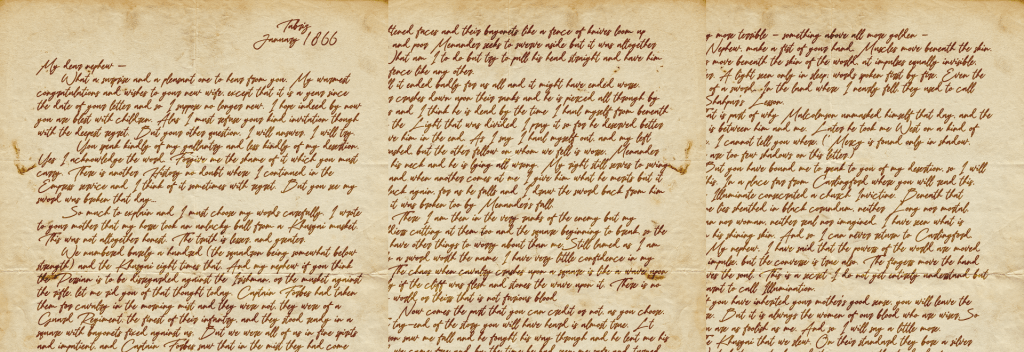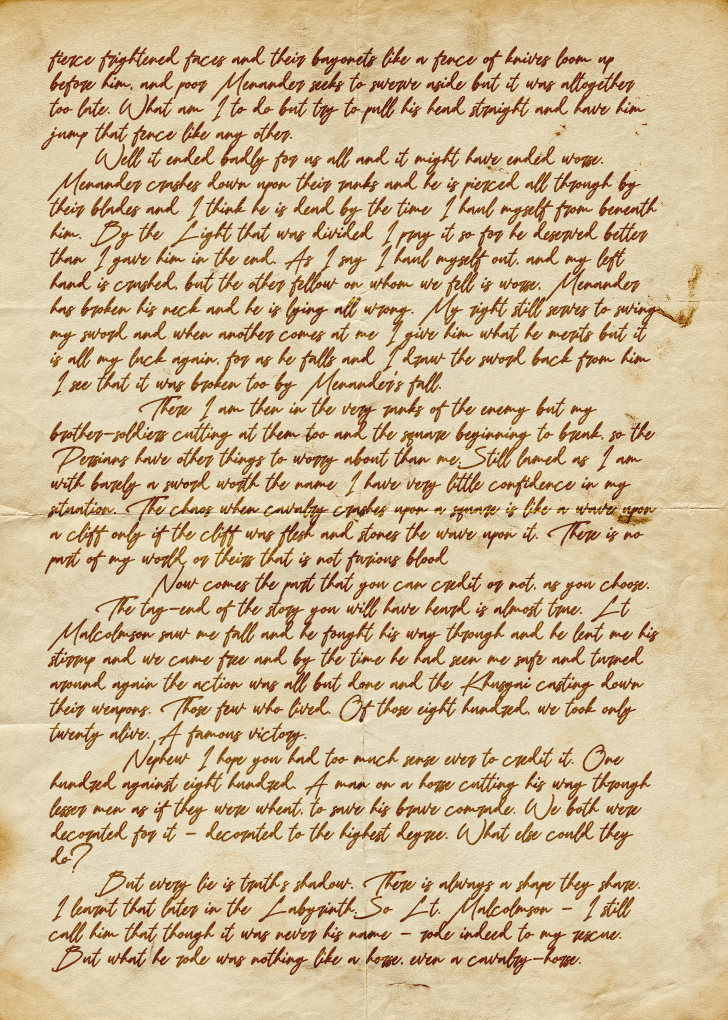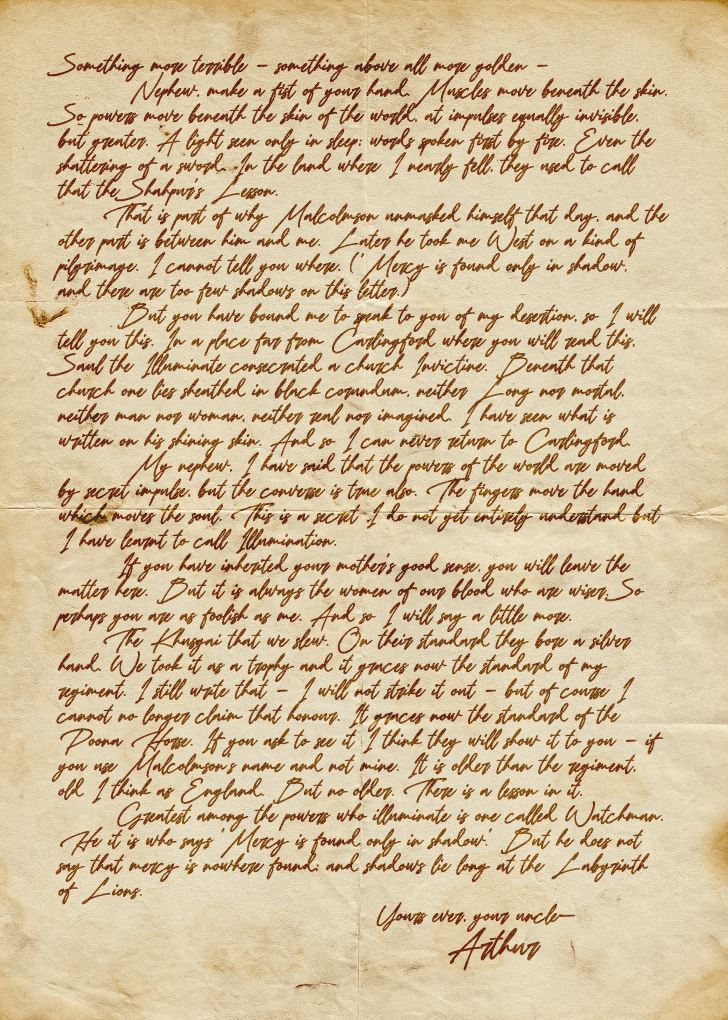
Tabriz, January 1866: My dear nephew –
Tabriz
January 1866
My dear nephew
What a surprise and a pleasant one to hear from you. My warmest congratulations and wishes to your new wife, except that it is a year since the date of your letter and so I suppose no longer new. I hope indeed by now you are blest with children. Alas I must refuse your kind invitation though with the deepest regret. But your other question, I will answer. I will try.
You speak kindly of my gallantry and less kindly of my desertion. Yes I acknowledge the word.
Forgive me the shame of it which you must carry. There is another History no doubt where I continued in the Empress’ service and I think of it sometimes with regret. But you see my sword was broken that day…
So much to explain and I must choose my words carefully. I wrote to your mother that my horse took an unlucky ball from a Khusgai musket. This was not altogether honest. The truth is lesser, and greater.
We numbered barely a hundred (the squadron being somewhat below strength) and the Khusgai eight times that. And my nephew if you think the Persian is to be disregarded against the Irishman, or the musket against the rifle, let me rid you of that thought today. Captain Forbes had taken them for cavalry in the morning mist and they were not, they were of a Guard Regiment, the finest of their infantry, and they stood ready in a square with bayonets fixed against us. But we were all of us in fine spirits and impatient, and Captain Forbes saw that in the mist they had come unstuck from the greater Persian force and were not supported. Here was glory and when he ordered the charge we cheered.
It was foolishness on foolishness and I have not told you yet of my own foolishness and yet all those were glory also. The Empire wished to keep the Shah from Herat (which was under our protection) but not to defeat him (for we needed him against the Russians). So we were fighting but not for victory. Then Capt. Forbes’ decision to charge them. And your uncle at the head of the charge with his sabre – I wish I could say it flashed in the sunshine as I brandished it but the mist, the mist. And the mist of course saved us or their muskets would have ended our charge untimely, but it deadened the sound of their fire so we knew not how close until we were on them. Suddenly your uncle sees their shakos and their fierce frightened faces and their bayonets like a fence of knives loom up before him, and poor Menander seeks to swerve aside but it was altogether too late. What am I to do but try to pull his head straight and have him jump that fence like any other.
Well it ended badly for us all and it might have ended worse. Menander crashes down upon their ranks and he is pierced all through by their blades and I think he is dead by the time I haul myself from beneath him. By the Light that was divided I pray it so for he deserved better than I gave him in the end. As I say I haul myself out, and my left hand is crushed, but the other fellow on whom we fell is worse, Menander has broken his neck and he is lying all wrong. My right still serves to swing my sword and when another comes at me I give him what he merits but it is all my luck again, for as he falls and I draw the sword back from him I see that it was broken too by Menander’s fall.
There I am then in the very ranks of the enemy but my brother-soldiers cutting at them too and the square beginning to break, so the Persians have other things to worry about than me. Still lamed as I am with barely a sword worth the name I have very little confidence in my situation. The chaos when cavalry crashes upon a square is like a wave upon a cliff only if the cliff was flesh and stones the wave upon it. There is no part of my world or theirs that is not furious blood…
Now comes the part that you can credit or not, as you choose.
The tag-end of the story you will have heard is almost true. Lt Malcolmson saw me fall and he fought his way through and he lent me his stirrup and we came free and by the time he had seen me safe and turned around again the action was all but done and the Khusgai casting down their weapons. Those few who lived. Of those eight hundred, we took only twenty alive. A famous victory.
Nephew I hope you had too much sense ever to credit it. One hundred against eight hundred. A man on a horse cutting his way through lesser men as if they were wheat, to save his brave comrade. We both were decorated for it – decorated to the highest degree. What else could they do?
But every lie is truth’s shadow. There is always a shape they share. I learnt that later in the Labyrinth. So Lt. Malcolmson – I still call him that though it was never his name – rode indeed to my rescue. But what he rode was nothing like a horse, even a cavalry-horse. Something more terrible – something above all more golden –
Nephew, make a fist of your hand. Muscles move beneath the skin. So powers move beneath the skin of the world, at impulses equally invisible, but greater. A light seen only in sleep; words spoken first by fire. Even the shattering of a sword. In the land where I nearly fell, they used to call that the Shahpur’s Lesson.
That is part of why Malcolmson unmasked himself that day, and the other part is between him and me. Later he took me West on a kind of pilgrimage. I cannot tell you where. (‘Mercy is found only in shadow,’ and there are too few shadows on this letter.)
But you have bound me to speak to you of my desertion, so I will tell you this. In a place far from Carlingford where you will read this, Saul the Illuminate consecrated a church Invictine. Beneath that church one lies sheathed in black corundum, neither Long nor mortal, neither man nor woman, neither real nor imagined. I have seen what is written on his shining skin. And so I can never return to Carlingford.
My nephew, I have said that the powers of the world are moved by secret impulse, but the converse is true also. The fingers move the hand which moves the soul. This is a secret I do not yet entirely understand but I have learnt to call Illumination.
If you have inherited your mother’s good sense, you will leave the matter here. But it is always the women of our blood who are wiser. So perhaps you are as foolish as me. And so I will say a little more.
The Khusgai that we slew. On their standard they bore a silver hand. We took it as a trophy and it graces now the standard of my regiment. I still write that – I will not strike it out – but of course I cannot no longer claim that honour. It graces now the standard of the Poona Horse. If you ask to see it I think they will show it to you – if you use Malcolmson’s name and not mine. It is older than the regiment, old I think as England. But no older. There is a lesson in it.
Greatest among the powers who illuminate is one called Watchman. He it is who says ‘Mercy is found only in shadow.’ But he does not say that mercy is nowhere found; and shadows lie long at the Labyrinth of Lions.
Yours ever
your uncle
Arthur






I find myself returning to this Rare Text endlessly. You truly have a gift for writing enthralling stories.